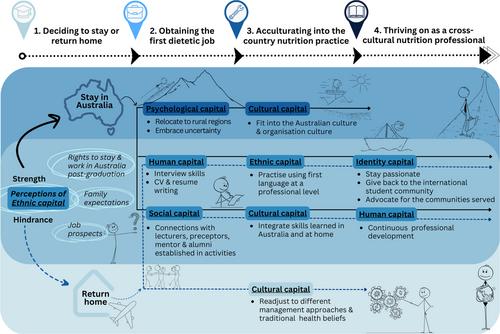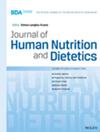Transition to work: A qualitative exploration of Australian-trained international dietetic graduates' career trajectories
Abstract
Background
Interest in the role of employability in student–dietitian transitions is increasing. However, little is known about the cross-cultural transition-to-work experience of Australian-trained dietetic graduates of international backgrounds, as well as strategies to optimise work-readiness. The present study aimed to explore graduates’ career narratives and identify employability capitals that enabled successful transitions to work.
Methods
A qualitative interpretive approach was employed via a cultural lens. Eighteen participants from five Asian countries who had graduated from an Australian university within 3–15 years, with work experience in Australia or in their respective home countries, took part in in-depth interviews. Thematic analysis was performed, guided by the graduate capitals based approach.
Results
Transition-to-work was dynamic and non-linear; four themes and 12 subthemes identified: (1) upon graduation, participants felt ambivalent about their decision to either stay in Australia or return home, influenced by graduate visa restrictions, and individual perceptions of their ability to mobilise cultural strengths to gain employment; (2) to get a foot in the door, participants demonstrated resilience, embraced uncertainty and utilised social networks to increase employment opportunities in Australia and their home countries; (3) regardless of which country they worked, graduates reported struggling with their cross-cultural identities in the workplace; and (4) eventually, these graduates appreciated their ethnic capital, thrived in their work and extended a helping hand to their junior cross-cultural dietitians.
Conclusions
Initiatives facilitating connections to the host country and supporting cultural and ethnic capital development, along with ongoing research reviewing employability capital applications, will benefit cross-cultural dietetic graduates and the communities they potentially will serve.


 求助内容:
求助内容: 应助结果提醒方式:
应助结果提醒方式:


